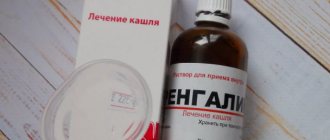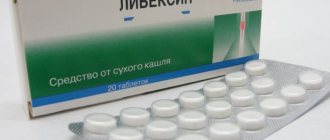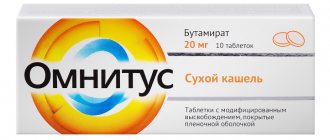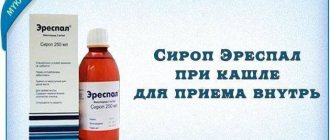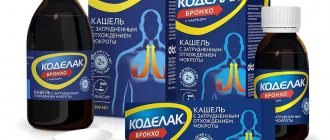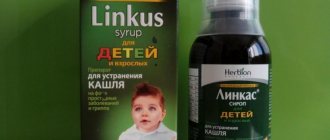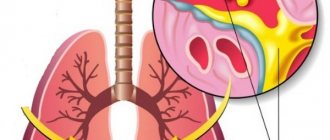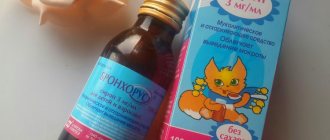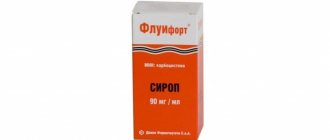Instructions for use
In this article you can find everything every consumer needs to know about taking the drug Revalgin. Here you can find information about indications, possible analogues, price range, method of administration/required dosage and how to calculate it (if required), contraindications and side effects, as well as what to do and where to go if you suddenly have an overdose. In addition to this information, here you can also find information about the combination of the medicine with other drugs, pharmacology, use during pregnancy/breastfeeding, conditions and shelf life.
Pharmacology
The drug Revalgin is a combination drug that has an antispasmodic and analgesic effect. Therapeutic effectiveness is the result of the action of certain active substances, namely:
- Metamizole - this component has an analgesic effect in the event of moderate pain by reducing the concentration of inflammatory mediators prostaglandins in the tissues in the affected area;
- Fenpiverinium - this substance has an anticholinergic effect, inhibits cholinergic receptors of smooth muscles, due to which it additionally has an antispasmodic effect.
With the simultaneous entry of all these substances into the human body, their therapeutic effect is significantly enhanced, the severity of pain decreases, the temperature decreases, and inflammation is relieved.
Indications
Revalgin in the form of tablets or solution is prescribed for the treatment of patients who have:
- Bladder spasm;
- Renal or hepatic colic;
- Biliary dyskinesia;
- Colic of the stomach or intestines.
The medicine relieves pain syndromes of ischalgia, neuralgia or arthralgia. Revalgin is also prescribed as an analgesic aid after surgery or diagnostic procedures. Tablets are prescribed for infectious and inflammatory processes or elevated temperature.
In addition, myalgia and migraine pain may be an indication for taking Revalgin in the form of injections.
How should this drug be taken for it to be beneficial?
The tablet form of the medicine should be taken after meals. Under no circumstances should they be chewed or dissolved in water. They should be swallowed whole with plenty of water.
The recommended dose for adults is one tablet, which should be taken twice or thrice a day (depending on the severity of the pain syndrome). In this case, the maximum permissible dosage should not exceed 6 tablets.
For children under 15 years of age, the dose is calculated based on age:
- For children aged six to eight years, the dosage is half a tablet;
- If the child is between nine and 12 years of age, the dose is three-quarters of a tablet;
- If the child is between 13 and 15 years old, the dose should in no case exceed one whole tablet.
The solution for administration is used both intramuscularly and intravenously. Before administering the ampoule with the solution, it should be warmed in your hands. Adults and adolescents over 15 years of age are given 2 ml of medication. If required, a second injection is given after 6-8 hours.
For children, the dosage is calculated according to the following scheme:
- At the age of 3 to 11 months, the dosage is 0.1-0.2 ml;
- If the child is 1-2 years old, then the medicine is administered in a dosage of 0.1-0.3 ml;
- If the child’s age is from three to four years, then the dosage is 0.2-0.4 ml;
- If the child’s age ranges from five to seven years, then the dosage is 0.3-0.5 ml;
- Child age from eight to twelve years - the dose is from 0.5 to 0.7 ml;
- If the child's age ranges from 12 to 15 years, the dosage is 0.8 ml.
The doctor decides on the need to re-administer the medicine in each individual case.
Composition data
The drug Revalgin is sold in several forms, namely tablets or an oral solution. It contains several active ingredients, which have different concentrations depending on the dosage form.
The active ingredients of this drug are metamizole, pitofenone hydrochloride, and fenpiverinium bromide. Auxiliary elements of the tablets are magnesium stearate, microcrystalline cellulose, silicon dioxide, lactose, starch, talc. The solution contains disodium edetate, sodium metabisulfite, purified water, sodium hydroxide.
Combination with other drugs
It is not recommended to simultaneously take this medicine in combination with other non-narcotic analgesics. This is necessary to avoid toxic effects.
Antidepressants slow down metabolism in the liver and several times increase the risk of developing toxicosis.
When taking the drug Revalgin and Barbiturates or any other inducers simultaneously, the effectiveness of the first drug is reduced.
Tranquilizers, as well as sedatives, enhance the analgesic effect of the drug. If you need to take these drugs simultaneously, you should consult your doctor.
Revalgin
Active substance:
Metamizole sodium*, Pitofenone*, Fenpiverinium bromide*
Pharmgroup:
NSAIDs. Pyrazolones in combinations
Average price in pharmacies
| Name | Manufacturer | average price |
| Revalgin 5ml n5 amp solution d/in | Shreya Life Sciences Pvt Ltd | 128.00 |
| Revalgin n100 tablet | Shreya Life Sciences Pvt Ltd | 464.00 |
Analogs for the active substance:Took Bralangin Spazgan Spasmalgon Spasmalin | Application area:Abdominal pain syndrome Obstetric and gynecological pain Pain syndrome Pain syndrome in the postoperative period Pain syndrome in the postoperative period after orthopedic surgery Pain syndrome of inflammatory origin Pain syndrome of non-oncological origin Pain syndrome after diagnostic procedures Pain syndrome after diagnostic interventions Pain syndrome after surgery Pain syndrome after surgical interventions Pain syndrome after orthopedic surgery Pain syndrome after injuries Pain syndrome after removal of hemorrhoids Pain syndrome after surgery Pain syndrome due to inflammation of non-rheumatic nature Pain syndrome in inflammatory lesions of the peripheral nervous system Pain syndrome in diabetic neuropathy Pain syndrome in muscular and joint diseases Pain syndrome in muscular and joint diseases Pain syndrome with neuralgia Pain syndrome in osteoarthritis Pain syndrome in osteoarthritis Pain syndrome in acute inflammatory diseases of the musculoskeletal system Pain syndrome in acute inflammatory diseases of the musculoskeletal system Pain syndrome due to tendon pathology Pain syndrome in renal colic Pain syndrome due to smooth muscle spasms Pain syndrome due to smooth muscle spasms Pain syndrome due to smooth muscle spasms Pain syndrome due to smooth muscle spasms (renal and biliary colic, intestinal spasms, dysmenorrhea) Pain syndrome due to smooth muscle spasms (renal and biliary colic, intestinal spasms, dysmenorrhea) Pain syndrome due to smooth muscle spasms (renal and biliary colic, intestinal spasms, dysmenorrhea) Pain syndrome due to spasms of smooth muscles of internal organs Pain syndrome due to spasms of smooth muscles of internal organs Pain syndrome due to spasms of smooth muscles of internal organs Pain syndrome due to spasms of smooth muscles of internal organs (renal and biliary colic, intestinal spasms, dysmenorrhea) Pain syndrome due to spasms of smooth muscles of internal organs (renal and biliary colic, intestinal spasms, dysmenorrhea) Pain syndrome due to spasms of smooth muscles of internal organs (renal and biliary colic, intestinal spasms, dysmenorrhea) Pain syndrome due to injuries Pain syndrome during injuries and after surgery Pain syndrome in chronic inflammatory diseases of the musculoskeletal system Pain syndrome in chronic inflammatory diseases of the musculoskeletal system Pain syndrome in chronic inflammatory diseases of the musculoskeletal system Pain syndrome in duodenal ulcer Pain syndrome with gastric ulcer Pain syndrome in gastric and duodenal ulcers Painful sensations Pain in the muscles Pain in the joints Pain during menstruation Pain syndromes Painful conditions Painful tired legs Sore gums when wearing dentures Muscle soreness Muscle soreness during heavy physical activity Joint pain Joint pain during heavy physical activity Tenderness of cranial nerve exit points Painful inflammatory joint lesions Painful, irregular periods Painful dressings Painful conditions of the musculoskeletal system Painful conditions of the musculoskeletal system Painful joint conditions Painful traumatic joint lesions Painful muscle spasm Painful muscle spasm Painful tooth growth Pain Pain in the musculoskeletal system Pain in the musculoskeletal system Muscle pain |
Side effects
If all recommended dosages of the drug Revalgin are followed, it is tolerated quite well. However, sometimes, as a result of taking the drug, a person may experience negative consequences, i.e. adverse reactions such as:
- Decreased blood pressure, tachycardia, dizziness, cyanosis;
- Thrombocytopenia, agranulocytosis, leukopenia;
- Fever, stomatitis, sore throat, chills, difficulty swallowing, development of vaginitis, proctitis;
- If a person has a tendency to develop bronchospasm, then an attack may develop if the medication is taken for a long time.
In addition, it is also possible to develop conditions such as:
- Anaphylactic shock, itching, urticaria, angioedema;
- Nephritis, oliguria, anuria, proteinuria. In addition, it is also possible to develop impaired renal function;
- Difficulty urinating, decreased sweating, accommodation paresis, necrolysis, dry mouth, headache, burning in the abdomen;
- Changes in mood and appetite, decreased vision.
In addition, in the case of intravenous or intramuscular administration of the drug, local reactions in the form of infiltrates may develop.
Attention! If you begin to experience these conditions, you should immediately consult a doctor.
What to do if you suddenly experience an overdose?
In the event of an overdose, a person may experience convulsions, dry mouth, impaired accommodation, confusion, and impaired kidney or liver function.
In the event of an overdose, you should carry out treatment based on the symptoms that exist. These actions include gastric lavage. For this, laxatives, enterosorbent/salt medications are prescribed, or a natural method is used. Hemodialysis is not excluded.
- See our article “The best folk remedy for gastritis!” To get rid of it QUICKLY and FOREVER...
- How to get rid of gases in the intestines and why do they occur?
- Activated carbon cleaning - is it worth starting?
When should you stop taking this medication?
There are a number of conditions in which taking Revalgin is unacceptable. These may include symptoms such as:
- Heart rhythm disturbances;
- Impaired patency of any part of the gastrointestinal tract;
- Significant enlargement of the colon;
- Prostatic hypertrophy, which is accompanied by impaired urine outflow;
- Bone marrow or blood pathologies;
- Pathological changes in the body, which are accompanied by a critical decrease in blood pressure;
- Allergy to individual components.
The solution has its own contraindications, which include symptoms such as:
- Angina pectoris, which is characterized by impaired circulation in the myocardium and the development of pain;
- Chronic heart failure;
- Hereditary pathology with damage to the peripheral nervous system;
- Children under three months of age or if the child weighs less than five kg.
This drug should be taken with extreme caution in the presence of serious liver/kidney pathologies.
How to take the drug during pregnancy
You should stop taking this medication in the first trimester, because At this time, the laying of all the vital organs of the baby is underway.
During breastfeeding, you should also avoid taking the medication.
The best pain reliever for menstruation
Menstruation is a common condition for women, they live with it.
Often periods are accompanied by pain in the lower abdomen, before or during their course. With severe constant pain, this condition is called dysmenorrhea. For many women, doctors prescribe painkillers during menstruation, especially if the condition is worsened by digestive problems, dizziness, or general malaise. ICD-10 divides dysmenorrhea into primary, with code 94.4, secondary, with code 94.5, and with an unspecified etiology, with code 94.6. Each type has its own reasons and symptoms, according to which the doctor chooses the direction of treatment.
Causes of pain during menstruation
Dysmenorrhea of the primary type occurs in girls of puberty and nulliparous women. Rarely does pain remain after the first birth.
Their main reasons:
- hereditary factors;
- unbalanced diet;
- absence or irregularity of sexual activity.
- Feeling worse during menstruation is caused by:
- vitamin deficiency;
- abortions;
- bend of the uterus;
- physiological underdevelopment of the genital organs;
- hormonal disorders;
- use of intrauterine devices.
Secondary dysmenorrhea is formed from diseases of the pelvic organs, inflammation of the female organs. During painful periods, the discharge is profuse, with the formation of blood clots.
Use of painkillers
Strong painkillers only help for a short time with primary type dysmenorrhea. The secondary type requires a preliminary examination by a gynecologist and treatment for the underlying disease.
The doctor bases the choice of painkillers on the mechanism of action of each drug. Some of them can relieve moderate pain, while others suppress severe pain attacks.
All medications have one negative property - they are addictive and become ineffective. After them, women have to switch to injections of strong drugs. Therefore, the choice of pain relief during menstruation must be approached carefully and listen to the doctor’s instructions. Painkillers for menstruation are listed in the list of names.
List of commonly used pain medications:
- Analgin;
- Ibuprofen;
- Ketoprofen;
- Naproxen;
- Indomethacin;
- Drotaverine;
- Piroxicam;
- Ketolong.
This is not a complete list of period pain pills, but contains the cheapest and safest medications that can be used consistently to relieve period pain.
Before taking pills, you can try to relieve pain with warm, but not hot! with a heating pad, applying it to your stomach, lying with it for 10-15 minutes in a comfortable position.
You can drink a cup of hot black tea by adding 1 tsp. cognac or balsam. If such remedies do not help, then you should move on to medications.
Review of effective menstrual pain relief tablets
Each medicine belongs to its own group of drugs. All of them are good painkillers for menstruation. The review is provided with a list of names and prices of drugs.
The group of non-steroidal drugs includes:
Paracetamol - price 19 rubles, permissible intake - up to 4 times a day; Contraindications: liver and kidney diseases.
Ibuprofen - price 25-46 rubles, depending on the packaging; Contraindications: Peptic ulcer, asthma, hemophilia.
Diclofenac - price 29-187 rubles, depending on packaging and manufacturer; contraindications - asthma, inflammation in the gastrointestinal tract.
Naproxen - price 80-289 rubles, depending on the packaging and manufacturer; contraindications - lactation period, bronchitis, ulcers of the digestive organs.
Ketoprofen - cost 58-315 rubles, depending on the packaging and manufacturer; take 2-4 times a day as prescribed by a doctor; contraindications - ulcerative colitis, liver and kidney dysfunction, hemophilia.
See the instructions for the dosage of all products or check with your doctor!
Many drugs are shown in the photo so that young women know what the packaging looks like and what dosage the medicine is offered in.
Non-steroidal drugs relieve pain well; for dysmenorrhea, the doctor recommends starting to take them 2-3 days before the start of your critical days. Each of the drugs has analogues, combined forms of the drug.
All painkillers for menstruation are inexpensive; a woman can choose the most suitable one based on the doctor’s prescription.
Group of antispasmodics:
No-shpa - price 54-201 rubles, depending on packaging and manufacturer; reception - 2-3 times a day; in case of contraindications - lactation period, pathologies of the liver, kidneys, heart, the doctor prescribes analogues.
Papaverine - price 6-71 rubles, depending on packaging and manufacturers; reception - 3-4 times a day; Contraindications: glaucoma, liver and heart damage.
Halidor - price 560-569 rubles, the active ingredient is bencyclane, which has a mild sedative property; reception - 3 times a day; contraindications - lactation time, dysfunction of internal organs, epilepsy, stroke.
Buscopan - price 373-391 rubles, active substance - hyoscine butyl bromide; reception - 3 times a day; contraindications - atherosclerosis, myasthenia gravis, glaucoma, lung diseases.
Taking any medication should be discussed with your doctor, especially in girls. Often it is necessary to use analogues, which depends on the contraindications for each drug. The doctor takes into account the duration of the cycle, the severity of the pain, and the presence of concomitant diseases in the teenage girl.
It is important that taking painkillers during menstruation, despite their prices, does not cause complications in the girl’s health.
A group of drugs based on metamizole sodium, non-narcotic analgesics:
Analgin - price 8-54 rubles, depending on packaging and manufacturer; relieves pain, relieves inflammation; reception - 2-3 times a day as prescribed by a doctor; contraindications - individual intolerance to metamizole sodium, bronchial and blood diseases.
Spazgan - price 35-114 rubles, depending on packaging and manufacturer; relieves moderate pain; take 2-3 times a day in the dosage prescribed by your doctor; contraindications - individual intolerance to metamizole sodium, liver, kidney, heart disease.
Spazmalgon - price 119-134 rubles, depending on packaging and manufacturer; relieves moderate pain; contraindications - individual intolerance to the main component, kidney disease, liver disease, heart disease, glaucoma.
Baralgin - price 53-236 rubles, depending on packaging, release form, manufacturers; relieves severe pain; contraindications - individual intolerance to the main component, liver disease, kidney disease, asthma.
Revalgin - price 97-394 rubles, depending on packaging and manufacturer; relieves moderate pain; contraindications - intolerance to the main component, liver disease, kidney disease, heart disease, glaucoma.
Maxigan - price from 120 rubles, depending on the form of release, manufacturer; relieves moderate pain; contraindications - allergies to the main component, diseases of the liver, kidneys, hematopoietic system, glaucoma.
All drugs of non-narcotic analgesics have an analgesic effect of varying strength. Only a doctor can prescribe their appointment after examining and examining the woman. He chooses the form, dosage, and regimen of taking the medicine.
Analogues of various drugs
Depending on the presence of contraindications, the doctor selects analogues of the medication to provide the woman with comfortable relief from menstrual pain and the absence of side effects.
Analogues of Ketoprofen are:
- Flamax;
- Dexalgin;
- Ketonal.
- Analogues of Diclofenac are:
- Rapten;
- Voltaren;
- Naklofen;
- Sanfinak;
- Diclovit.
- Analogues of No-shpa are:
- Drotaverine;
- Unispaz;
- Spasmonet;
- Spakovin.
Each medicine has similar substitute drugs.
Doctors know them and can choose the remedy that will most effectively help a woman with menstrual pain and will not cause her trouble with side complications.
Source: https://woman.rambler.ru/health/42564825-luchshee-obezbolivayuschee-pri-mesyachnyh/
What do patients think about this product?
As a rule, you can find only positive reviews on the Internet. Everyone notes the low cost of the drug and its high effectiveness.
The disadvantages of the drug include an extensive list of side effects, as well as contraindications. It is worth understanding that when taking the drug, it is important to strictly follow the instructions and in no case deviate from them.
If you have ever encountered the use of this product, then please leave your review about it.
special instructions
Patients with diabetes mellitus should approach taking the medicine with great caution, since every 5 ml of solution contains 0.3 g of maltitol, the processing of which requires the hormone insulin.
The drug is compatible with other medications, so it can be safely used as part of complex therapy for colds and all kinds of allergic diseases.
It does not affect the effectiveness of antibiotics and antivirals, which makes it an excellent remedy for eliminating one of the most unpleasant symptoms of acute respiratory infections, cough.
In addition, the medicine does not cause drowsiness, therefore, after taking it, it is not prohibited to drive a car or work with mechanisms that require increased attention.
Contraindications
The drug is used with caution in people under 18 years of age, with a history of hypotension, bronchial asthma, and the aspirin triad. Contraindications:
- intolerance to the components of the composition;
- deficiency of glucose-6-phosphate dehydrogenase;
- first and last trimesters of pregnancy, lactation;
- angle-closure glaucoma;
- cardiac ischemia;
- prostatic hypertrophy;
- collapsed state;
- disruption of the gallbladder;
- urinary retention;
- intestinal atony;
- proctitis;
- irritable bowel syndrome;
- megacolon;
- intestinal obstruction;
- blood diseases.
Drug interactions
The combined use of Revalgin with certain substances/drugs can lead to the development of the following effects:
- Ethanol: mutually enhancing effects;
- Other non-narcotic analgesics: toxic effects are mutually enhanced;
- Drugs with sedative effects and tranquilizers: the analgesic effect of Revalgin is enhanced;
- Oral contraceptives, allopurinol, tricyclic antidepressants: the metabolism of metamizole in the liver is disrupted, its toxicity increases;
- Hypoglycemic drugs for oral administration, indirect anticoagulants, glucocorticosteroids, indomethacin: the severity of their action increases;
- Phenylbutazone, barbiturates and other inducers of microsomal liver enzymes: the effect of metamizole is weakened;
- Chlorpromazine or other phenothiazine derivatives: severe hyperthermia develops;
- Cyclosporine: its level in the blood decreases;
- H1-histamine blockers, quinidine, phenothiazines, butyrophenones, amantadine: m-cholinolytic effect increases;
- H2-histamine blockers, propranolol, codeine: inactivation slows down and the effect of metamizole sodium increases;
- X-ray contrast agents, colloidal blood substitutes: interaction develops (the combination is not recommended).
Revalgin in the form of an injection solution is pharmaceutically incompatible with other drugs/substances.
Pharmacodynamics and pharmacokinetics
Pharmacodynamics
Revalgin is a combined antispasmodic and analgesic drug. It contains: pitofenone hydrochloride , metamizole sodium and fenpiverinium bromide . The process of action of the drug is based on the pharmacological active properties of the components.
Pitophenone is an antispasmodic agent that has a strong myotropic effect, similar to papaverine . Pitofenon reduces the increased tone of the smooth muscle layers of internal organs, eliminates spasms, and has an analgesic effect in case of spastic pain.
Metamizole sodium is an anti-inflammatory non-steroidal substance based on pyrazolone . Metamizole has anti-inflammatory, antipyretic, analgesic effects, thereby reducing the synthesis of pro-inflammatory cytokines . This in turn leads to an intensive reduction in the inflammatory process.
Phenpiverinium bromide is an anticholinergic drug . Due to anticholinergic processes, the smooth muscle layer of internal organs relaxes.
All active substances of Revalgin potentiate each other, thereby increasing the effect of the drug.
Pharmacokinetics
Metamizole sodium partially binds to blood proteins, undergoes metabolism in the liver and is excreted in the urine in the form of metabolites .
Compatibility with alcoholic drinks
Any alcoholic beverages, regardless of taste and strength, contain ethyl alcohol. And this substance is incompatible with the active ingredients of the drug "Revalgin".
Indications for the use of Revalgin tablets in themselves are already sufficient grounds for completely eliminating alcoholic beverages from the diet. Alcohol in any quantity has a negative effect on liver cells. Beer and low-alcohol drinks are often consumed in large quantities, which has an extremely negative effect on the functioning of the kidneys. As a result, during treatment with Revalgin, drinking alcoholic beverages not only does not provide relief, but also worsens health and well-being problems. If a person is unable to stop drinking alcohol after taking a pill, then we are most likely talking about chronic alcoholism. Such conditions should be discussed with the attending physician; everything should not be left to chance.
Pharmacological properties
The product contains the non-narcotic analgesic metamizole sodium, the myotropic antispasmodic pitofenone and the anticholinergic drug fenpiverinium. Metamizole is a pyrazolone derivative with analgesic, anti-inflammatory and antipyretic effects. Pitophenone is similar in action to papaverine, relaxes smooth muscles. Phenpiverinium blocks and relaxes smooth muscles.
Overdose
In case of an overdose of the drug, the following may occur:
- disturbance of accommodation;
- dry mouth;
- confusion;
- convulsions;
- disruption of the liver and kidneys.
In case of overdose, symptomatic therapy is carried out. The stomach is washed and enterosorbent and saline laxatives are prescribed. Hemodialysis and forced diuresis are not excluded .
Analogs
Level 4 ATC code matches:
Antipyrine
Analdim
Reopirin
Tempalgin
Benalgin
Pentalgin ICN
Pentalgin N
Pentalgin
Analgin
Tetralgin
Spasmalin
Maxigan
Sedal-M
Piralgin
Baralgin M
Sedalgin Plus
Andipal
- Baralgin;
- Maxigan;
- Baralgetas;
- Spasmalgon;
- Spasmalin;
- Spazgan.
